Jun 24 2009
The state announced 12 winning research projects that will receive part of $3 million in nanobiotechnology research funding from the 2009 Maryland Nanobiotechnology Research and Industry Competition Grants. Jeff Bulte, an affiliated faculty member of the Institute for NanoBioTechnology and professor of Radiology in the School of Medicine, received a one-time $230,000 to commercialize a promising therapy for type 1 diabetes.

Bulte and his postdoctoral fellow Dian Arifin are collaborating with the Baltimore-based company Surgivison Inc. on a project entitled Image-Guided Encapsulated Cell Therapy using Multimodal Nanoparticles. Bulte explains that the project aims to develop microcapsules that contain human islets, the insulin producing cluster of cells in the pancreas, which will be part of a cell therapy for type 1 diabetes. The microcapsules are engineered to protect the islets from attack by the immune system, which would normally treat them as foreign invaders. In addition, the transplanted islets microcapsules also have gadolinium-gold nanoparticles embedded in them so that they can be easily seen with non-invasive imaging techniques, such as magnetic resonance, X-ray, computerized tomography, or ultrasound.
"The gadolium-gold nanoparticles allow the encapsulated islets to be injected under imaging guidance. That way you can monitor how many microparticles actually make it to the target site and how many capsules rupture and are subsequently rejected by the immune system," says Bulte. "As part of our team, Surgivision Inc. is developing catheters and injection devices that can be used to deliver and detect our encapsulated islets in real-time."
According to a press release from the state Department of Business and Economic Development (DBED), this was Maryland's first nanobiotechnology research grants competition. DBED, through the Maryland Biotechnology Center, and Maryland Technology Development Corporation jointly administered the nanotechnology grant competition. 103 applications were received in response to the competition's solicitation with 43 finalists subject to technical reviews of their research proposals.
Said Gov. Martin O'Malley in the release, "These grants are an important part of our long-term strategy for growing Maryland's bioscience industry, creating jobs, and positioning Maryland as a national leader in bio and life sciences… (They) will provide critical funding to Maryland companies working to develop innovative life saving technologies for the treatment of cancer and diagnosis of infectious diseases."
The Johns Hopkins Institute for NanoBioTechnology (INBT) at Johns Hopkins University brings together more than 175 researchers from the Bloomberg School of Public Health, Krieger School of Arts and Sciences, School of Medicine, Applied Physics Laboratory, and Whiting School of Engineering to create new knowledge and new technologies at the interface of nanoscience and medicine.